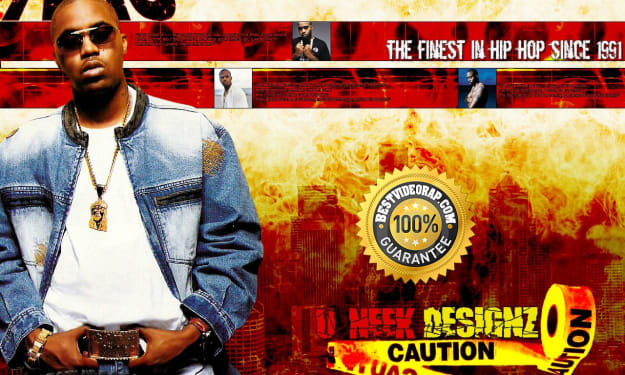
Album: The Lost Tapes
Artist: Nas
Distributed by: Ill Will Records Columbia Records
Release: 9.23.02
A Review By Brian Salkowski (originally written in 2003)
The Lost Tapes is a rare gem in the hip hop world, a collection of unreleased songs that showcase Nas' lyrical prowess and storytelling skills.
The album has a nostalgic and introspective tone, as Nas reflects on his life, his career, and his influences. He raps about his childhood in Queensbridge, his love for hip hop culture, his struggles with fame and money, and his personal relationships. He also touches on social issues such as racism, violence, and drug addiction. The production is mostly minimalistic and soulful, with samples from jazz, funk, and R&B classics. The beats complement Nas' smooth and expressive flow, creating a mellow and mature sound.
Some of the highlights of the album include "Doo Rags", a tribute to the old school rap era; "Purple", a vivid description of Nas' drug-induced state of mind; "Drunk by Myself", a confessional song about alcoholism and loneliness; "Black Zombie", a critique of the oppression and self-destruction of black people; and "Poppa Was a Playa", a candid song about Nas' father and his influence on him. The album also features guest appearances from artists such as Alchemist, Kanye West, D-Dot, and L.E.S., who contribute to the production and the lyrics¹².
The Lost Tapes features introspective lyrics and themes of urban life, sociology, and despair. Its music is characterized by low-key beats, sparse production, subtle string flourishes, mellow piano work, and subdued soul music loops.
His ability to use urban vernacular to paint spectacular visions of realism is often overlooked and downplayed. Perhaps he believed that these tales, designed to cause a thug to wax nostalgic, were not what the people wanted. As a result of this alleged aversion to the soulfulness of Hip-Hop, Nas placed some of his most moving tracks back in the can.
Nas focuses on linear scenarios and on human motivations. Unlike many hard rappers, Nas' tales of ghetto horror are not covert boasts but expressions of true fear. I took note to a cinematic tale of self-destruction in 'Drunk by Myself,' and a compelling autobiography narrated from the womb in 'Fetus.' "
The opening track "Doo Rags" contemplates Nas' youth and society's cyclical nature. It features a contemporary piano loop and jazz tones.
Irony is fairly obvious - despite the song's title, Nas has been one of rap's most original artists for a decade running. As it stands now, this album is far from the typical quality of "rediscovered and unreleased" material that most musicians put out between studio albums. Such CD's are often infamous for having one great song (usually from a soundtrack) and a lot of weak joints, but not this time. From L.E.S. to Precision to even Deric 'D-Dot' Angelettie, all the music is quality, and Nas spits the purest verbal’s. No cameos, no hype, no bullshit. In this case it's not just an advertising campaign, it's true. "The Lost Tapes" is for the Nas fans, but even the haters will have to respect this one.
Nas’ quasi-legendary “lost tapes” are a collection of songs that became B-Sides from the enigmatic “I Am” Bootleg as well as a couple others he recorded for the album . What makes Nas different from other gangster rappers is his incredibly keen eye for detail; he wants to give his listener all the pleasures of Dre’s and Eminem’s style of sonic cartooning while also allowing room for more complicated, introspective and truthful emotions as well. “Just a baby n***a/ Thankful when them killers came through/ Guns out, moving, “Nas remembers. “I thank the ones who said ‘shorty go home, we about to be shooting.’ ” Nas’ ability to deal with his own vulnerability in such moments without being mawkish—or casting himself as the tough guy with the gun—is the source of most of his best rhymes. He has his own perspective on the violence—he’s a storyteller.
The Lost Tapes is also a long-awaited step forward from an artist who was uniquely burdened by the success of his first record. Illmatic was a great record—so good that it’s hard to imagine Nas ever making a better one. The perspective he chose then, and has essentially stuck to ever since, was startlingly original in rap; he wrote first-person rhymes in the voice of a young kid who was growing up in the projects, with his eyes wide open to the world of violence, drugs, and guns that West Coast rappers claimed to inhabit in life. The youthful persona he invented allowed the rapper to uphold the East Coast values of lyrical and narrative complexity while also being “realer” than the L.A. rappers on their favorite subjects—drug dealing and gang warfare.
Nas could also flow better than any other rapper in New York—continuing a story or developing a character for minutes without losing the thread of his rhyme.
There’s even a message here—a message that begins with a rejection of the materialism of his publicity-crazy rival Jay-Z.
“U Gotta Love It,” the third joint in the sequence, is not as emotionally moving as the others but it’s not wack either. To be real, it’s kind of vintage Nas…or should I say typical Nas. It’s just what we have come to expect. “Blaze A 50” brings us back to the style reminiscent of his Escobar persona. It is a tale of greed and destruction. “Everybody’s Crazy” is nothing special, but “Purple” is that NYC style groove that you can really appreciate while cruising on the Westside highway, spying the lights on the Jersey side of the Hudson River. It is very reflective and moving. “Drunk By Myself” fits in the same mode and creates a similar mood. “Black Zombie” is a call for Black renaissance and reevaluation. It is a bit preachy, but true…so true. “Poppa Was A Playa” is a shout out to a disruptive father figure and how his perspective of him changed as Nas got older. A respectable effort. “Fetus” is a hidden track in which Nasir Jones develops from a new seed to a child. Once again, we are treated to his descriptive talents.
When were the cuts that make up Nas’ The Lost Tapes composed? According to “Reading Nas”, in 1999 Nas recorded 31 songs for the double album, “I Am The Autobiography”. After constant album leaks thanks to Napster, the double album was changed to 1 and all the songs were either left on the floor, some used for Nastradamus album, and some for the compilation album, “Death Of Escobar” in 2000. One thing is for sure, the set as a whole, has a crisp laid-back feel to it; conforming to the ear’s palate like a Yankee fitted takes the head’s shape or like a throwback jersey fits the torso. The first track on the album is titled “Doo Rag,” a piano propelled painting of time and space as seen through the third eye of Nas, which can easily be envisioned by any New York City dweller. Another cut that features a piano style track as well as funky horns and a driving beat is “My Way.” Nas’ tells of how he rose out of the crumbs of the slums by pursuing a dream with reckless abandon.
Something that was very surprising during my research. Though questions still surround the origins of “Déjà Vu,” its themes – together with Nas’ cadence and flow – indicate it was recorded sometime in early ‘95. Nas’ blistering first verse is instantly recognizable, as he used it again for his guest spot on Raekwon’s “Verbal Intercourse,” from the latter’s 1995 classic Only Built 4 Cuban Linx…. Meanwhile, the hypnotic beat – produced by one-time Sony Music Studios assistant Chris Winston and topped with that signature mid-90s east coast production staple, the sleigh bell – carries echoes of “One On One,” another forgotten Nas gem which featured on the soundtrack to the 1994 movie Street Fighter.
According to Winston, “Déjà Vu” had been set for inclusion on It Was Written but was yanked from the final release as the powers-that-be felt its street-level aesthetic jarred with the glitzier, more polished vision they had for the album. Then it was brought to the of the suits at Columbia to include it on "The Lost Tapes". For whatever reason the song did not make the final cut but by then hardcore fans had already found the precious gem. Still, the chorus (“Here’s a toast to my foes, trees and women (déjà vu)/It’s like a whole new beginning”) and the third verse (“Escobar life, gems and raw Tims/Gators for pretty boy haters/In Vegas with chicks tricking’ fortunes…”) offer some illuminating early clues as to the direction Nas’ music was beginning to take at that point.
With a discography as massive as Nas, it's extremely hard for a record company to release all the songs that are still on the cutting room floor yet to be heard by the world. The Lost Tapes in my opinion was solid. Would I have loved to see ALL THE SONGS that were gonna be on "I Am"? Absolutely. But at the end of the day this album did the job.
About the Creator
Brian
I am a writer. I love fiction but also I'm a watcher of the world. I like to put things in perspective not only for myself but for other people. It's the best outlet to express myself. I am a advocate for Hip Hop & Free Speech! #Philly






Comments
There are no comments for this story
Be the first to respond and start the conversation.